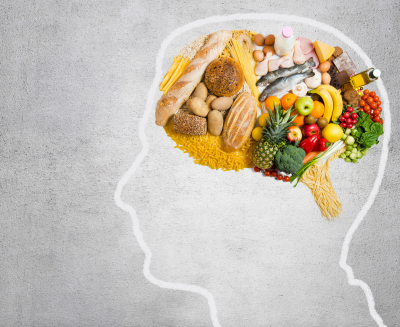Written by UConn Dietetics Masters student Paulina Karwowski
Food Is Fuel
 Food is fuel, as the saying goes! Yet, we often forget to make sure that the fuel we put into our bodies are the healthiest varieties. Logically, it makes sense: what we put in can help make us what we are. Thus, if we put poor fuel into our body, our brain functioning, cognitive abilities, and mood may be affected.
Food is fuel, as the saying goes! Yet, we often forget to make sure that the fuel we put into our bodies are the healthiest varieties. Logically, it makes sense: what we put in can help make us what we are. Thus, if we put poor fuel into our body, our brain functioning, cognitive abilities, and mood may be affected.
Mental Health Concerns are Rising
With the recent rise of mental health concerns, brain health is becoming a notable issue to tackle. Depression specifically, represents 99% of all “mind-brain illnesses”.3 Furthermore, according to the CDC, 1 in 5 Americans will experience a mental illness in a given year. For 2022, the CDC also reported that 19.86% of adults experienced mental illness.
The Gut-Brain Connection
The bacteria in our gut produce many neurochemicals that are then used by the brain. Those neurochemicals regulate our feelings about the world around us and about ourselves. Serotonin is a chemical made by nerve cells that sends messages about mood, emotions, and specifically happiness. A majority of serotonin, approximately 95%, is said to be produced by the bacteria made in the gut. When we eat healthy foods, we feed both our body processes and the bacteria which keep the healthy cycle going. The “good” bacteria in the gut help us limit our body inflammation, which can contribute to long-term health problems.
Which Food Impacts the Brain the Most?
Sugar has been shown to increase inflammation in our bodies. Thus, limiting foods that include added sugar is a healthy choice to make. Vitamin B12, folate, and zinc deficiencies have been linked to depression.2 B12 is found in animal meat, fish, eggs, and dairy. Folate is in dark leafy green vegetables, grains, peanuts, and fruit juice. Zinc can be found in meat and seafood. In general, eating a healthy, diverse, colorful diet is your best bet!
Brain-Friendly Snack Ideas:
- Nuts, seeds, and plant butters
- Fish (salmon, tuna)
- Berries and greens
References:
- Facts about Depression.” Hope For Depression, 25 Jan. 2021, https://www.hopefordepression.org/depression-facts/?utm_source=google_cpc&utm_medium=ad_grant&utm_campaign=depression_facts&gclid=CjwKCAiA0cyfBhBREiwAAtStHJjcMiaXMt-lu6VSV-YHKufXe79DkJDSpm3IslvV05uOTOv1Oci3VhoC0igQAvD_BwE.
- MD, Eva Selhub. “Nutritional Psychiatry: Your Brain on Food.” Harvard Health, 18 Sept. 2022, https://www.health.harvard.edu/blog/nutritional-psychiatry-your-brain-on-food-201511168626.
- Lachance, Laura, and Drew Ramsey. “Food, Mood, and Brain Health: Implications for the Modern Clinician.” Missouri Medicine, U.S. National Library of Medicine, 2015, https://www.ncbi.nlm.nih.gov/pmc/articles/PMC6170050/.
This material is funded by UDSA’s Supplemental Nutrition Assistance Program (SNAP).
This institution is an equal opportunity provider